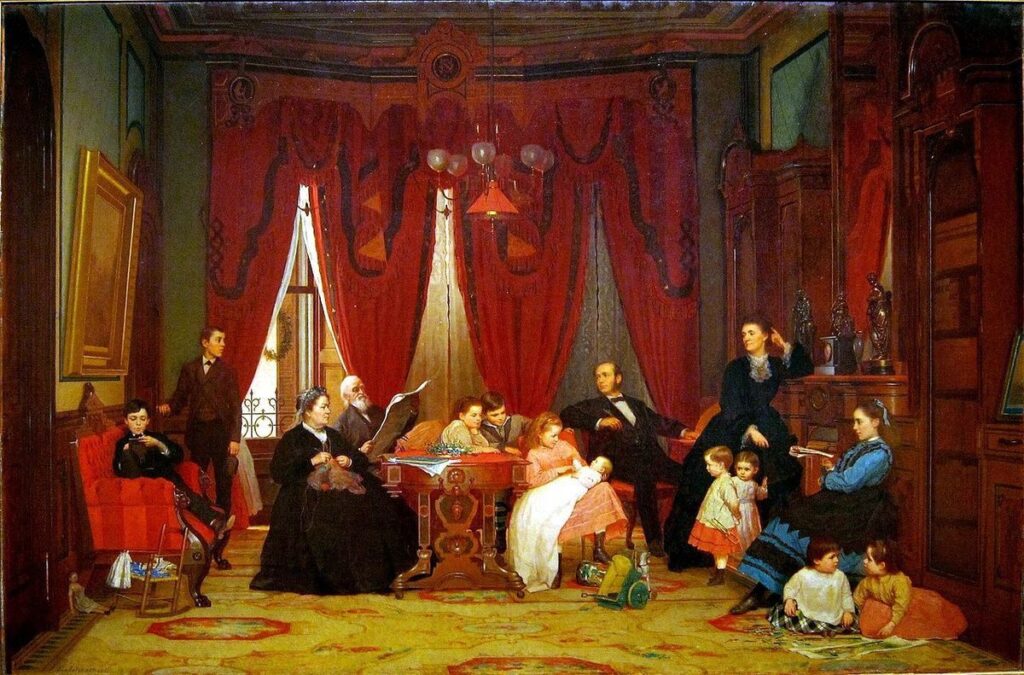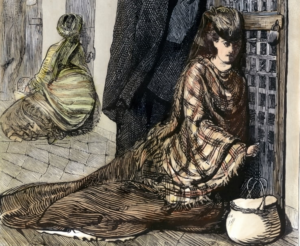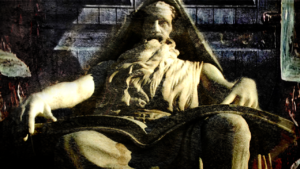The Roman Family Clan

“I do not think that any unprejudiced man will deny that the Roman family is one of the most glorious achievements of the human mind, one of those heights which cannot be scaled twice, and to which the most distant generations will look up in admiration, making sure at the same time that they themselves are not straying too far from the right path” – Joseph Chamberlain
If one were interested in reviving or re-imagining the Roman family model, one must adopt a certain pagan view to life, at least in the veneration of family itself, in the observance of rites to ancestors. In addition one must think, always, towards building a framework for future family, as the hereditary extension of the individual soul. The larger, more important part of it.
There is no reason for Christians to not consider this, keeping in mind the more archaic habits of their worship link back to pagan times, and a good deal of their values are traceable to Platonism. Christians associating ‘all things pagan’ with the devil is a doctrine they need to revise, much as other biblical claims have also required revision.
To see worth in oneself is to wish to see it magnified in one’s children and descendants. Personalized, unique family sigils, logos, house gods, mannerisms, fashion, art, and culture should be the goal of the sitting patriarch of any clan. Not the homogenization of the family to ‘fit in’, in all manner and habit, with the flabby conglomerate mass of the TV-directed ‘public’. Necessary imitation of the mass is the illusion of the false culture, a remnant from times when the nation was the larger family. Now they are only the dancing marionettes of the borderless economic-zone.
In Roman times the country at large could be said to be a family extension. Sadly this has (for now) dissipated, and the clan-limit is very much closer. While the gibbering, soft-hearted globalists believe they make the world one big family, they instead make each family a more isolated island. Regardless, this essential genealogical strength is the foundation of the larger organism, and of everything worthwhile in life.
In the Roman conception of the family, the godfather of the extended family is the priestly patriarch of Jupiter – performing fire-rituals to the sky father with his sacred dagger, while giving offerings to the gods and the ancestral spirits of the dead. For those of a more Catholic extraction something like this should not be out of the question, or at least, not to be expected from a worthy godfather.
Young members of the family clan MUST study classical literature and philosophy, otherwise what they are doing is not education at all. They must become accustomed to ancient virtues (the only virtue). The family should create its own sacred rituals and cultivate a personal patriarchal concept of familial valor, so that the family name can gain honour, and retain it as blood-earned and sacrosanct. Minor families who cultivate a eugenic heredity of values can accumulate honour, which can be then blood-bound to their name. The true tenets of honour do not revolve around simplistic pities and petty forgivenesses.
The Roman head of the family (the pater familias) was in charge of even adult males in the familia (including slaves). Today such apater familias would be equally responsible for transmitting the family morality, reputation, and heirlooms across generations, to safeguard the passing of these in hopes that they increase. To fail in this due to selfishness is a paramount sin. But just like everything else, no family is functional without the order of hierarchy.
There is nothing more important than strong families and communities. What is the opposite? It is the lone commodified individual. It is the obese lesbian who learned she can ‘have it all’ from Sex and the City’, or the anemic bugman who learned about valor from marvel films. Both sterile, aspiritual, vapid, and morbidly indulged. A genealogical dead-end of the blood.
This atomization of the family clan occurs by instilling rebellion in the young, who are naturally predicated to rebellion, of a certain sort. But it can incite them to rebel against everything good, everything they need, in the confusing chaos of the outer-family (the larger clan, or country) being at war with the immediate family.
Evil enters our societies in gradual steps, by cleverly disguising itself as compassion, to people with no conception of nuance, who have only a superficial (or symbolic) grasp of concepts. People who believe they are being ‘good’ because they use the word ‘good’. True good, in the classical sense, is a deep understanding of a long term blood-good, the determination of which requires, above all, balance. Part of that balance is understanding the absolute necessity of taking action, and making hard decisions, for a better future.
This is why the family clan must keep their ritual fire of worship burning, so the unique ancestral folk wisdom remains for generations to come. Genuine change is incremental, not radical. The Romans educated their own young, and tended their own hearth, and were there to venerate and remember their own deceased ancestors. Somebody in the future who is blood-connected must venerate those who have passed, to keep cohesion of the larger organism.
Every pairing of a man and woman is the potential seed of an empire, both personally and in a wider sense.











